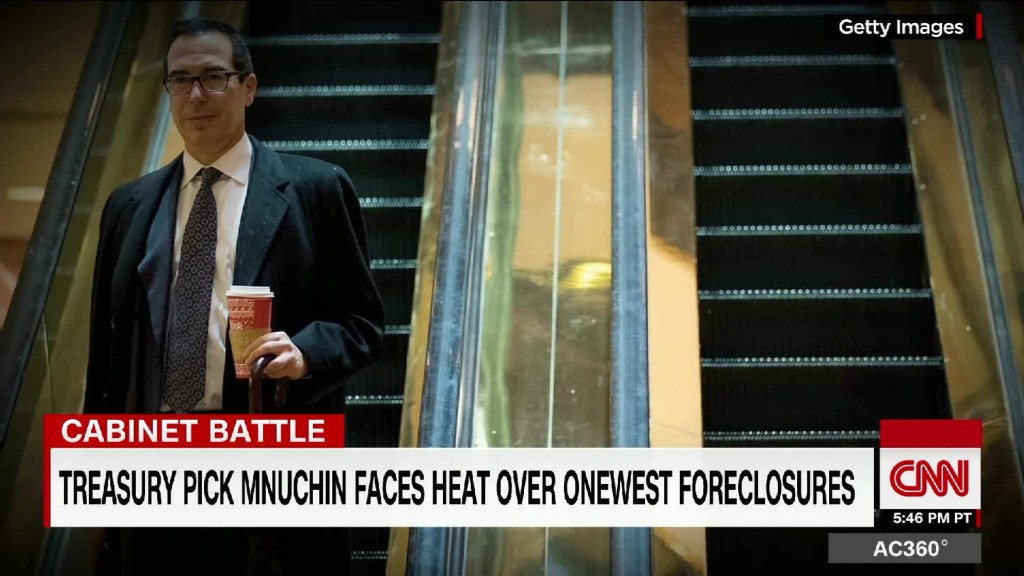
Donald Trump's nominees will soon start trudging to Capitol Hill to face tough questioning from lawmakers. But a small army of experts at one federal agency is already working around-the-clock to make sure they resolve their financial conflicts before they start their new jobs.
The little-known Office of Government Ethics, or OGE, is the executive branch's anti-corruption gatekeeper.
The agency, which typically stays out of the spotlight, made news last November when its director sent out a curious burst of tweets about the president-elect's supposed divestiture of his business interests.
But it has played a key behind-the-scenes role in the presidential transition process for decades. The office was established to enforce the Ethics in Government Act of 1978 (passed in the wake of the Watergate scandal).
Now the complex financial holdings of Trump's appointees -- more billionaires than any cabinet ever -- pose a challenge for the agency, according to current and former OGE officials, outside attorneys and ethics experts.
Agency 'focused like a laser beam on the transition'
Trump himself doesn't have to formally comply with the conflicts statute, because presidents are exempt. But thousands of other executive branch employees, like Trump's cabinet appointees, are bound by this criminal law and other ethics regulations.
For nominees, the process starts by completing a draft financial disclosure report known as Form 278e, listing everything from assets and liabilities, to stock transitions and 401k plans. This form goes through multiple rounds of review and revisions by the White House Counsel's Office and by OGE prior to being finalized.
OGE has a relatively small staff of 75 employees and an even smaller group of staffers who focus on reviewing nominees' files. The agency's officials are said to be highly detail-oriented when drilling down on the minutiae of nominees' finances and assisting with the preparation of the disclosure report. No detail is too small.
"They will come back with comments literally saying there's supposed to be a comma before 'Inc.,'" said one outside law firm partner who regularly represents nominees in their dealings with OGE.
An OGE official said the agency is currently using "as many resources as possible" to review files for Trump's nominees. "We are focused like a laser beam on the transition," the official said.
One person working with OGE is Commerce Secretary nominee Wilbur Ross, the billionaire who has made a fortune cobbling together dying companies.
In responses to senators' questions, Ross referred to his coordination with OGE in identifying "any potential conflicts that may arise in connection with (his) retained investments."
But evaluating the nominee's finances is only part of the larger task.
OGE also holds the power to prescribe specific, concrete actions that nominees must take to resolve any potential conflicts before taking office. The nominee might agree to sell assets that pose clear conflicts, or pledge to recuse himself from certain matters.
ExxonMobil (XOM) CEO Rex Tillerson, who Trump has picked as his secretary of state, plans to sell the more than 600,000 Exxon shares and shield millions more he is due to receive in an independently managed trust.
Ultimately, the nominee and OGE formalize their plan to minimize conflicts into an ethics agreement. For instance, Penny Pritzker, a billionaire heir to the Hyatt Hotels fortune who now serves as President Obama's commerce secretary, kept her Hyatt stock but promised in an 18-page ethics agreement to resign from the company and stay away from any matters that could conflict with her government job.
After potential conflicts are addressed, OGE sends the Senate a package with the nominee's ethics agreement, the financial disclosure report and a cover letter certifying the report.
As a general matter, the ethics agreement and disclosure report are released to the public on OGE's website roughly a day after they are submitted to the relevant Senate committee. So far, OGE has released the ethics agreements and financial disclosure reports for Trump's picks for attorney general, Sen. Jeff Sessions, and CIA director, Rep. Mike Pompeo.
"We want to the get information to the public as quickly as we can. That's part of the mission," an OGE official explained. "But there could be a change in policy in any aspect of this process [when the new administration takes office]."
Washington 'a very different environment' for wealthy appointees
While the office has historically kept a low-profile, OGE Director Walter Shaub has not shied away from voicing his view that Trump should divest himself of his vast business interests.
"Transferring operational control of a company to one's children would not constitute the establishment of a qualified blind trust, nor would it eliminate conflicts of interest," Shaub wrote in a letter last month.
Shaub, who was appointed by Obama in 2013, will not end his five-year term until January 2018, but he will soon serve at the pleasure of President Trump.
For all the vetting power it has, OGE is not an enforcement agency. It does not investigate or adjudicate ethics complaints -- those are referred to the Justice Department.
In a larger sense, however, the agency's review process functions as an eye-opener for presidential appointees new to public life.
"It's partly about socializing very powerful, wealthy people to the fact that they're about to enter a very different environment," said one outside lawyer.
-- CNNMoney's Jill Disis contributed to this story.
